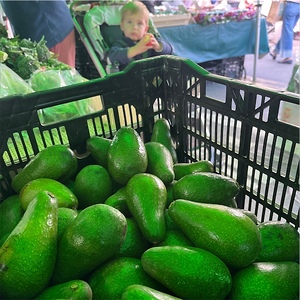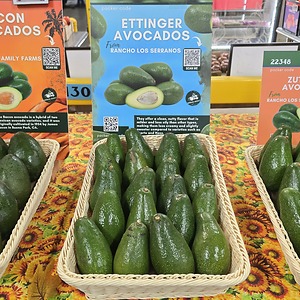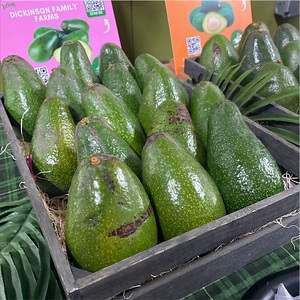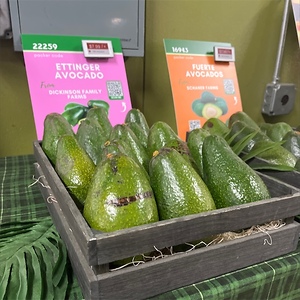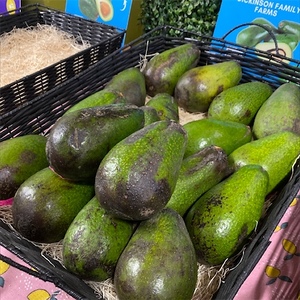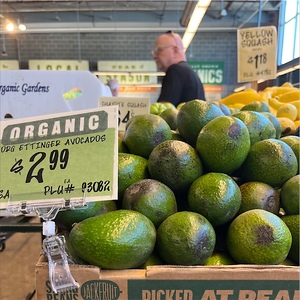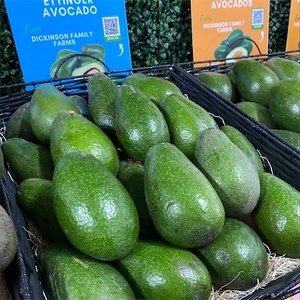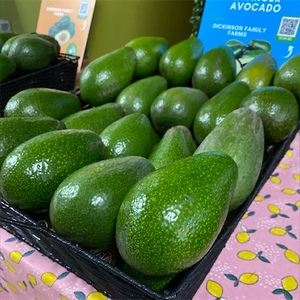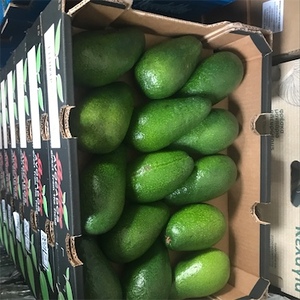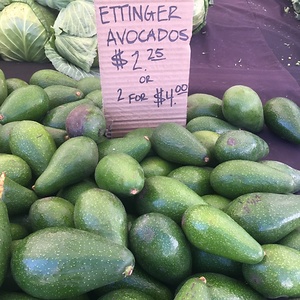

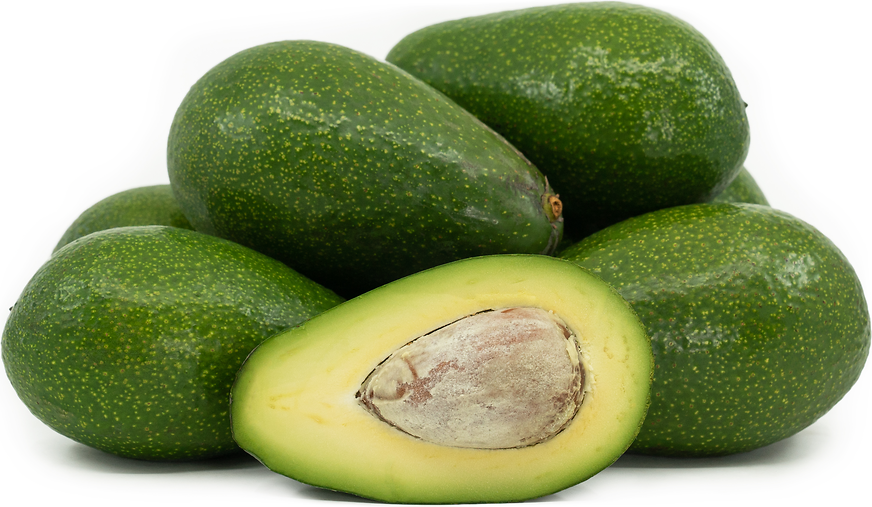
Ettinger Avocados
Estimated Inventory, ea : 0
Description/Taste
Ettingers are a large-sized avocado with a distinct pear shape. They weigh between 9 to 20 ounces and measure approximately 12 to 18 centimeters in length with a diameter of 6 to 9 centimeters. The skin of an Ettinger Avocado is bright green, dotted with lighter green spots, and features a smooth, leathery texture that is easy to peel and may exhibit slight dimpling. The inner flesh of the Ettinger Avocado is pale green-yellow, creamy, and encases a large seed, or stone, that conforms to the fruit's shape, tapering to a pointed top. This stone constitutes up to twenty-five percent of the fruit's weight, which is larger than those in many other avocado varieties. Ettinger Avocados emit a mild and slightly sweet aroma. They offer a clean, nutty flavor that is milder and less oily than other types, making them less creamy and slightly sweeter compared to varieties such as Fuerte and Hass.
Seasons/Availability
Ettinger Avocados are available from October to March in their native Israel and from February to June in California.
Current Facts
The botanical name of the Ettinger Avocado is Persea americana 'Ettinger', and it is part of the Lauraceae family, technically classified as a berry. Similar to Fuerte, Zutano, and Bacon Avocados, the Ettinger is a Type B avocado. This classification relates to the timing of their flowers' male and female phases. Type B avocados' flowers open as female in the afternoon, close, and then reopen as male the following morning. This pattern facilitates cross-pollination with Type A varieties, such as the widely cultivated Hass avocados. Planting both Type A and B avocados nearby not only boosts fruit yield by ensuring more available pollen but also promotes biodiversity. Ettinger Avocado trees grow straight up with minimal spreading and, like the Fuerte variety, it sometimes produces seedless fruits known as "cukes." These are mini seedless pickle shaped avocados that can be harvested and sold as Cocktail avocados and eaten skin and all.
Nutritional Value
Ettinger Avocados are rich in fiber, potassium, and folic acid, nutrients that support digestion, blood sugar management, cellular and muscle function, blood pressure regulation, as well as heart and mental health. They contain vitamins K, C, and B, which are essential for blood clotting and bone health, immune function and collagen synthesis, as well as energy production and brain development, respectively. Ettinger Avocados contain healthy monounsaturated fats that serve as a "nutrient booster," enhancing the absorption of fat-soluble vitamins and nutrients like alpha and beta-carotene and lutein. This can increase the nutritional value of other vegetables and fruits consumed in the same meal.
Applications
Ettinger Avocados have an edible, smooth-textured pulp and a large, inedible central seed. Best enjoyed raw to avoid bitterness from tannins when cooked at high heat, they can be sliced and served with apples, nuts, and cheese, or simply seasoned with lemon juice, salt, and pepper. The most popular way to consume avocados, including the Ettinger variety, is in guacamole, where they are mashed with salt, lime, garlic, and cilantro, along with chilies and tomatoes depending on the recipe. Ettinger Avocados can be used in smoothies, spread as avocado butter on toast, or added to tacos, nachos, soups, stews, and chili. They enhance salads, sandwiches, wraps, and dips. Deep frying Ettinger Avocados can be achieved without bitterness by carefully managing frying time and temperature. Complementary pairings include onions, chili peppers, olive oil, balsamic, red wine, or apple cider vinegar, and cheeses such as feta, goat, or blue, along with seafood like shrimp, crab, and smoked salmon. To preserve flavor, add avocados at the end of the cooking process rather than boiling. Accelerate ripening by storing them in a paper bag with an apple or banana at room temperature, leveraging the ethylene gas from these fruits. To slow down ripening, keep avocados in a sealed plastic bag to restrict oxygen. Store avocados at room temperature until ripe, usually about one week, then refrigerate for two to three days if needed. To keep a cut avocado's color, treat the exposed surfaces with lemon juice and tightly cover with plastic wrap to minimize air exposure.
Ethnic/Cultural Info
The three main strains of avocados are Mexican, West Indian, and Guatemalan. The Ettinger Avocado, bred in Israel during the 1940s, is a hybrid derived from Mexican and Guatemalan varieties. The Mexican type is noted for its thin skin and anise-scented leaves, whereas the Guatemalan type has thicker, more durable skin. The breeding of the Ettinger Avocado was part of Israel's broader agricultural initiatives to develop crop varieties that were well-suited to the local environment.
Geography/History
Ettinger Avocados are native to Israel. They are a cold and wind-resistant variety that thrives in abundant sunlight and well-drained soil. They are ideally suited to Mediterranean and subtropical climates. As a product of agricultural breeding, Ettinger Avocados do not occur naturally in the wild and are predominantly cultivated commercially in Israel. They were first grown in Kefar Malal, Israel in 1947 and introduced to California in 1954, though they remain relatively uncommon in the U.S. Their limited popularity compared to other varieties can be attributed to their shorter growing season, which poses challenges for harvesting and transporting. Ettinger Avocados are primarily sold in local markets within their growing regions, such as Israel and parts of the Mediterranean. In California, they may be found at farmer's markets and are also grown in home gardens in suitable climates.
Recipe Ideas
Recipes that include Ettinger Avocados. One
| Sage Mountain Farm |
|
Crispy Oven-Baked Avocado Fries (Gluten-Free, Vegan) |
| Alexandra's Kitchen |
|
Blood Oranges and Ettinger Avocados |
Podcast



